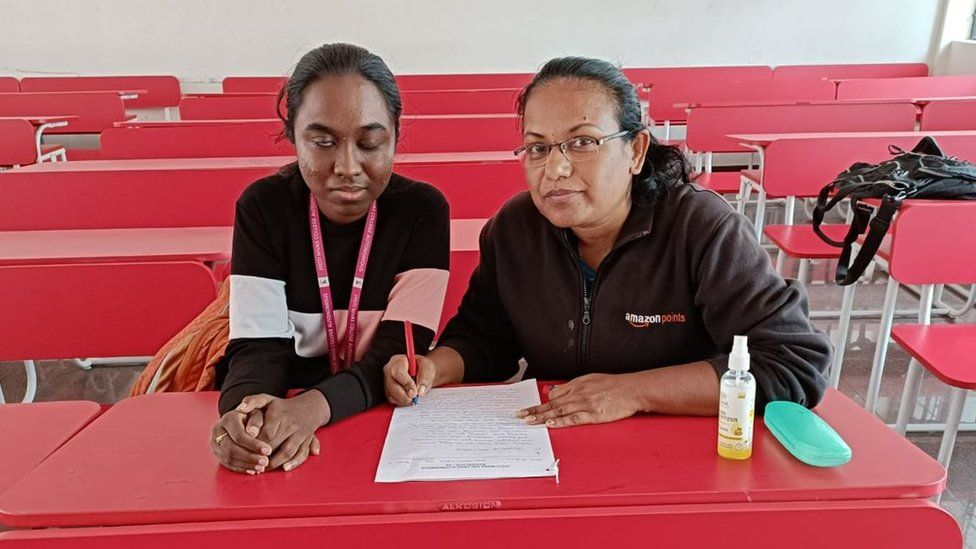
In 2007, a blind man asked Pushpa to guide him across a busy road in Bengaluru, a teeming metropolis in southern India. After they reached the other side, he made another request which changed her life.
"He asked me if I could write an exam for his friend," recalls Pushpa, who goes by one name.
She said yes, but when the day came, her excitement gave way to anxiety. She had never written an exam for someone else and didn't know what to expect.
Many Indian students with physical or learning disabilities use a scribe to write exams on their behalf. They dictate answers to the scribe, who notes them down. As per government guidelines, scribes are not allowed to write for any subject they themselves have studied at university level. They can get a defined fee for exams conducted by the government, but most of the time, the work is voluntary.
"It was three hours of tension. The candidate was dictating the answers very slowly and was asking me to read out the questions again and again," says Pushpa, who chose to help out for free.
But she did enough to help 19-year-old Hema (who uses one name) pass her school final exams.
Soon, an NGO working with blind people approached Pushpa for help and then other students. In the past 16 years, Pushpa has written over 1,000 exams, free of charge.
"Exam halls are like a second home for me," she tells the BBC.
In addition to school and university exams, Pushpa has also helped candidates appearing in entrance exams and selection tests for government jobs.
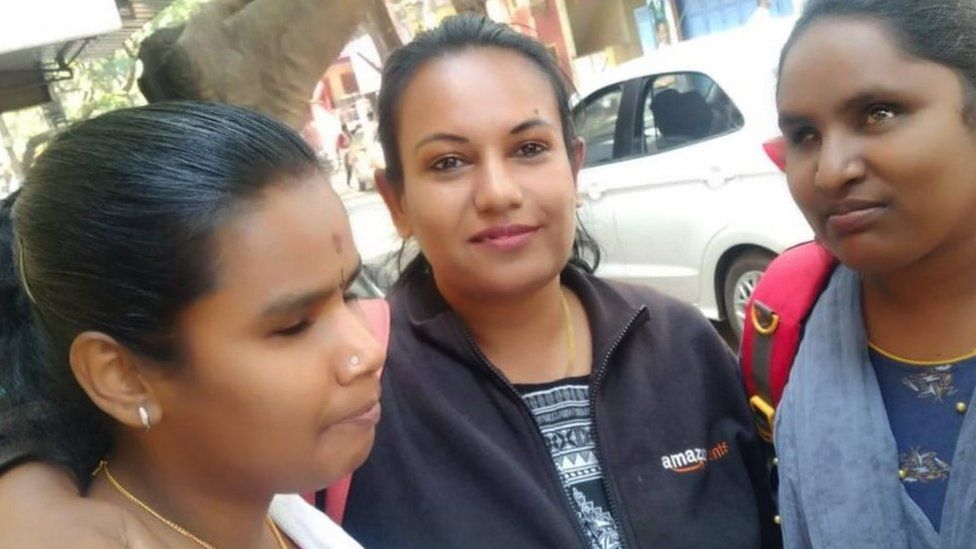
"Now it is routine work for me. I don't feel any stress," she says, adding that the experience has helped her learn about many subjects she had no knowledge in - from history to statistics.
She has helped blind students, those with cerebral palsy, Down's syndrome, autism, dyslexia and students incapacitated by accidents.
But it can be challenging sometimes. When working with students with cerebral palsy, which often impairs speech, Pushpa says she has to "concentrate hard and look at their [the students'] lip movements to try to understand words".
But she takes it in stride. She has helped Karthik (he goes by one name), who uses a wheelchair, write 47 exams.
It was a crises that forged their long association. During a school exam, Kartik's scribe left abruptly and Pushpa stepped in to help. The 25-year-old says he greatly appreciates her continual support since then.
"I'm lucky to get a scribe like Pushpa. Scribes are really like gods for us," he says.
Working together for years has given them a great understanding of each other - Karthik has now graduated and is preparing for government clerical recruitment exams.
"I have written multiple exams for many students and each one has a unique story," Pushpa says.
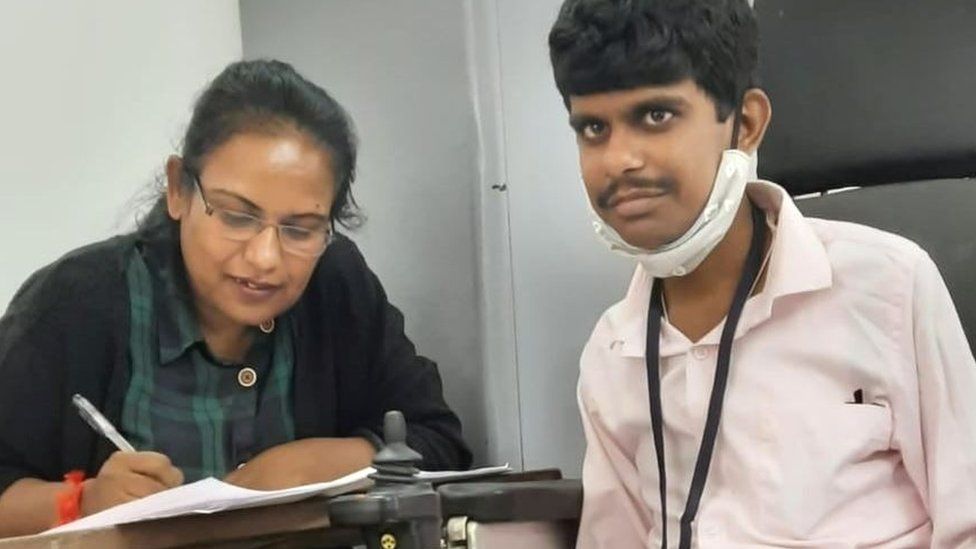
In the third week of March, Pushpa wrote a university degree exam paper for 19-year-old Bhoomika Valmiki.
Ms Valmiki, who is blind, uses tools that convert text to audio to study, but such apps cannot be used during exams.
"I can only move forward in my life if Pushpa writes for me," Ms Valmiki says.
"Pushpa was very patient and waited till I finished my answers. She never distracted me and repeated my answers before writing them down," she adds.
Most people who seek Pushpa's help have struggled to get into university, yet she says her empathy won't undermine her integrity.
"My job is to write what they say," she says. "I have no choice when they ask me to tick a wrong answer or dictate a sentence which is grammatically incorrect. I can't intervene."
When students who speak other languages struggle to understand English words she translates the word for them. "That is the only help I give," Pushpa says.
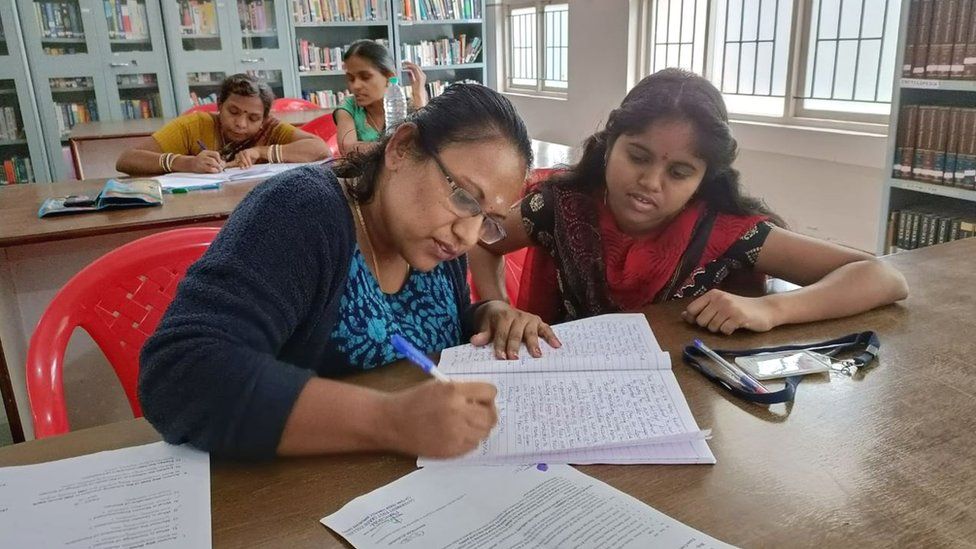
Pushpa comes from a poor family. After her father was injured in an accident, her mother worked hard to feed her and her brother.
"At one point, me and my brother had to drop out of school because we couldn't pay fees," she recalls.
A stranger stepped in to help and Pushpa says she volunteers as a scribe to give back this goodness to society.
She has taken up several small jobs over the years to make a living, but the past few years have been particularly hard.
In 2018, her father died and in 2020, her brother passed away. A year later, Pushpa, who was then unemployed, got some more bad news.
"In May 2021, my mother passed away. A few months later, in August, I wrote 32 exams. Some days I would write two exams."
She says she found scribing therapeutic and helpful in overcoming her grief.
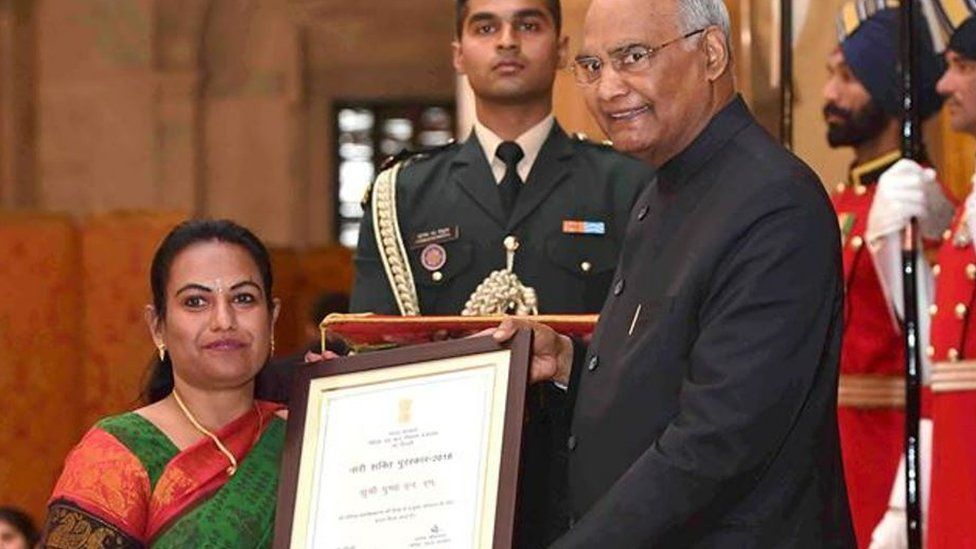
Her tireless work has not gone unnoticed. On 8 March 2018, she was honoured by the then Indian president, Ram Nath Kovind, for her efforts. She also met Prime Minister Narendra Modi along with other award winners.
Pushpa now works in a tech start-up and gives motivational talks at corporate events.
But she still writes exams for those who cannot, and since she can speak and write in five Indian languages - Tamil, Kannada, English, Telugu and Hindi - there's plenty of demand for her services.
"I give my time and energy. If I write an exam for someone, it changes their life," she says.
https://ift.tt/vyW1i0d
2023-05-28 02:47:41Z
CBMiMmh0dHBzOi8vd3d3LmJiYy5jb20vbmV3cy93b3JsZC1hc2lhLWluZGlhLTY1NjkyNjI40gE2aHR0cHM6Ly93d3cuYmJjLmNvbS9uZXdzL3dvcmxkLWFzaWEtaW5kaWEtNjU2OTI2MjguYW1w

0 Commentaires